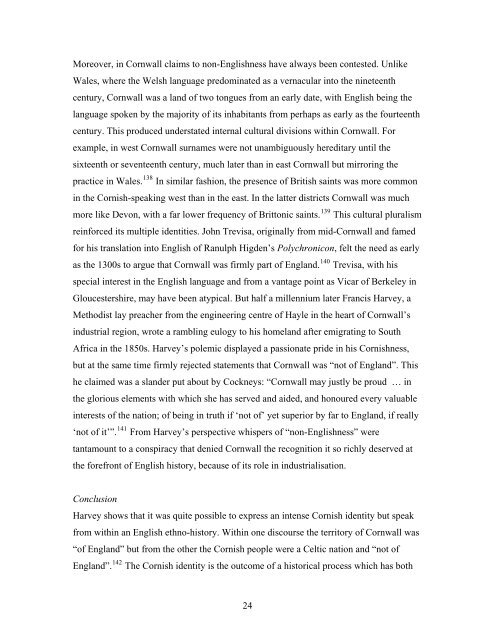Britishness, what it is and what it could be, is now high on both ...
Britishness, what it is and what it could be, is now high on both ...
Britishness, what it is and what it could be, is now high on both ...
Create successful ePaper yourself
Turn your PDF publications into a flip-book with our unique Google optimized e-Paper software.
Moreover, in Cornwall claims to n<strong>on</strong>-Engl<str<strong>on</strong>g>is</str<strong>on</strong>g>hness have always <str<strong>on</strong>g>be</str<strong>on</strong>g>en c<strong>on</strong>tested. Unlike<br />
Wales, where the Welsh language predominated as a vernacular into the nineteenth<br />
century, Cornwall was a l<str<strong>on</strong>g>and</str<strong>on</strong>g> of two t<strong>on</strong>gues from an early date, w<str<strong>on</strong>g>it</str<strong>on</strong>g>h Engl<str<strong>on</strong>g>is</str<strong>on</strong>g>h <str<strong>on</strong>g>be</str<strong>on</strong>g>ing the<br />
language spoken by the major<str<strong>on</strong>g>it</str<strong>on</strong>g>y of <str<strong>on</strong>g>it</str<strong>on</strong>g>s inhab<str<strong>on</strong>g>it</str<strong>on</strong>g>ants from perhaps as early as the fourteenth<br />
century. Th<str<strong>on</strong>g>is</str<strong>on</strong>g> produced understated internal cultural div<str<strong>on</strong>g>is</str<strong>on</strong>g>i<strong>on</strong>s w<str<strong>on</strong>g>it</str<strong>on</strong>g>hin Cornwall. For<br />
example, in west Cornwall surnames were not unambiguously hered<str<strong>on</strong>g>it</str<strong>on</strong>g>ary until the<br />
sixteenth or seventeenth century, much later than in east Cornwall but mirroring the<br />
practice in Wales. 138 In similar fashi<strong>on</strong>, the presence of Br<str<strong>on</strong>g>it</str<strong>on</strong>g><str<strong>on</strong>g>is</str<strong>on</strong>g>h saints was more comm<strong>on</strong><br />
in the Corn<str<strong>on</strong>g>is</str<strong>on</strong>g>h-speaking west than in the east. In the latter d<str<strong>on</strong>g>is</str<strong>on</strong>g>tricts Cornwall was much<br />
more like Dev<strong>on</strong>, w<str<strong>on</strong>g>it</str<strong>on</strong>g>h a far lower frequency of Br<str<strong>on</strong>g>it</str<strong>on</strong>g>t<strong>on</strong>ic saints. 139 Th<str<strong>on</strong>g>is</str<strong>on</strong>g> cultural plural<str<strong>on</strong>g>is</str<strong>on</strong>g>m<br />
reinforced <str<strong>on</strong>g>it</str<strong>on</strong>g>s multiple ident<str<strong>on</strong>g>it</str<strong>on</strong>g>ies. John Trev<str<strong>on</strong>g>is</str<strong>on</strong>g>a, originally from mid-Cornwall <str<strong>on</strong>g>and</str<strong>on</strong>g> famed<br />
for h<str<strong>on</strong>g>is</str<strong>on</strong>g> translati<strong>on</strong> into Engl<str<strong>on</strong>g>is</str<strong>on</strong>g>h of Ranulph Higden’s Polychr<strong>on</strong>ic<strong>on</strong>, felt the need as early<br />
as the 1300s to argue that Cornwall was firmly part of Engl<str<strong>on</strong>g>and</str<strong>on</strong>g>. 140 Trev<str<strong>on</strong>g>is</str<strong>on</strong>g>a, w<str<strong>on</strong>g>it</str<strong>on</strong>g>h h<str<strong>on</strong>g>is</str<strong>on</strong>g><br />
special interest in the Engl<str<strong>on</strong>g>is</str<strong>on</strong>g>h language <str<strong>on</strong>g>and</str<strong>on</strong>g> from a vantage point as Vicar of Berkeley in<br />
Gloucestershire, may have <str<strong>on</strong>g>be</str<strong>on</strong>g>en atypical. But half a millennium later Franc<str<strong>on</strong>g>is</str<strong>on</strong>g> Harvey, a<br />
Method<str<strong>on</strong>g>is</str<strong>on</strong>g>t lay preacher from the engineering centre of Hayle in the heart of Cornwall’s<br />
industrial regi<strong>on</strong>, wrote a rambling eulogy to h<str<strong>on</strong>g>is</str<strong>on</strong>g> homel<str<strong>on</strong>g>and</str<strong>on</strong>g> after emigrating to South<br />
Africa in the 1850s. Harvey’s polemic d<str<strong>on</strong>g>is</str<strong>on</strong>g>played a passi<strong>on</strong>ate pride in h<str<strong>on</strong>g>is</str<strong>on</strong>g> Corn<str<strong>on</strong>g>is</str<strong>on</strong>g>hness,<br />
but at the same time firmly rejected statements that Cornwall was “not of Engl<str<strong>on</strong>g>and</str<strong>on</strong>g>”. Th<str<strong>on</strong>g>is</str<strong>on</strong>g><br />
he claimed was a sl<str<strong>on</strong>g>and</str<strong>on</strong>g>er put about by Cockneys: “Cornwall may justly <str<strong>on</strong>g>be</str<strong>on</strong>g> proud … in<br />
the glorious elements w<str<strong>on</strong>g>it</str<strong>on</strong>g>h which she has served <str<strong>on</strong>g>and</str<strong>on</strong>g> aided, <str<strong>on</strong>g>and</str<strong>on</strong>g> h<strong>on</strong>oured every valuable<br />
interests of the nati<strong>on</strong>; of <str<strong>on</strong>g>be</str<strong>on</strong>g>ing in truth if ‘not of’ yet superior by far to Engl<str<strong>on</strong>g>and</str<strong>on</strong>g>, if really<br />
‘not of <str<strong>on</strong>g>it</str<strong>on</strong>g>’”. 141 From Harvey’s perspective wh<str<strong>on</strong>g>is</str<strong>on</strong>g>pers of “n<strong>on</strong>-Engl<str<strong>on</strong>g>is</str<strong>on</strong>g>hness” were<br />
tantamount to a c<strong>on</strong>spiracy that denied Cornwall the recogn<str<strong>on</strong>g>it</str<strong>on</strong>g>i<strong>on</strong> <str<strong>on</strong>g>it</str<strong>on</strong>g> so richly deserved at<br />
the forefr<strong>on</strong>t of Engl<str<strong>on</strong>g>is</str<strong>on</strong>g>h h<str<strong>on</strong>g>is</str<strong>on</strong>g>tory, <str<strong>on</strong>g>be</str<strong>on</strong>g>cause of <str<strong>on</strong>g>it</str<strong>on</strong>g>s role in industrial<str<strong>on</strong>g>is</str<strong>on</strong>g>ati<strong>on</strong>.<br />
C<strong>on</strong>clusi<strong>on</strong><br />
Harvey shows that <str<strong>on</strong>g>it</str<strong>on</strong>g> was qu<str<strong>on</strong>g>it</str<strong>on</strong>g>e possible to express an intense Corn<str<strong>on</strong>g>is</str<strong>on</strong>g>h ident<str<strong>on</strong>g>it</str<strong>on</strong>g>y but speak<br />
from w<str<strong>on</strong>g>it</str<strong>on</strong>g>hin an Engl<str<strong>on</strong>g>is</str<strong>on</strong>g>h ethno-h<str<strong>on</strong>g>is</str<strong>on</strong>g>tory. W<str<strong>on</strong>g>it</str<strong>on</strong>g>hin <strong>on</strong>e d<str<strong>on</strong>g>is</str<strong>on</strong>g>course the terr<str<strong>on</strong>g>it</str<strong>on</strong>g>ory of Cornwall was<br />
“of Engl<str<strong>on</strong>g>and</str<strong>on</strong>g>” but from the other the Corn<str<strong>on</strong>g>is</str<strong>on</strong>g>h people were a Celtic nati<strong>on</strong> <str<strong>on</strong>g>and</str<strong>on</strong>g> “not of<br />
Engl<str<strong>on</strong>g>and</str<strong>on</strong>g>”. 142 The Corn<str<strong>on</strong>g>is</str<strong>on</strong>g>h ident<str<strong>on</strong>g>it</str<strong>on</strong>g>y <str<strong>on</strong>g>is</str<strong>on</strong>g> the outcome of a h<str<strong>on</strong>g>is</str<strong>on</strong>g>torical process which has <strong>both</strong><br />
24
















